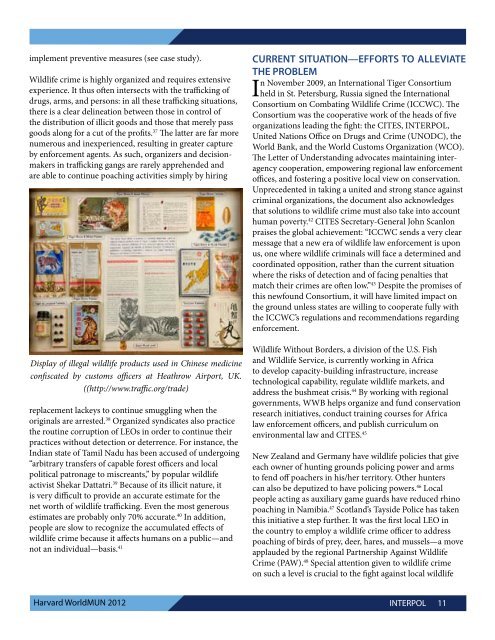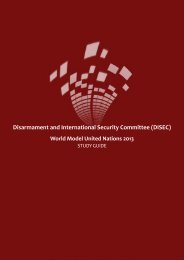INTERPOL - World Model United Nations
INTERPOL - World Model United Nations
INTERPOL - World Model United Nations
Create successful ePaper yourself
Turn your PDF publications into a flip-book with our unique Google optimized e-Paper software.
implement preventive measures (see case study).<br />
Wildlife crime is highly organized and requires extensive<br />
experience. It thus oen intersects with the tracking of<br />
drugs, arms, and persons: in all these tracking situations,<br />
there is a clear delineation between those in control of<br />
the distribution of illicit goods and those that merely pass<br />
goods along for a cut of the prots. 37 e latter are far more<br />
numerous and inexperienced, resulting in greater capture<br />
by enforcement agents. As such, organizers and decisionmakers<br />
in tracking gangs are rarely apprehended and<br />
are able to continue poaching activities simply by hiring<br />
Display of illegal wildlife products used in Chinese medicine<br />
conscated by customs ocers at Heathrow Airport, UK.<br />
((http://www.trac.org/trade)<br />
replacement lackeys to continue smuggling when the<br />
originals are arrested. 38 Organized syndicates also practice<br />
the routine corruption of LEOs in order to continue their<br />
practices without detection or deterrence. For instance, the<br />
Indian state of Tamil Nadu has been accused of undergoing<br />
“arbitrary transfers of capable forest ocers and local<br />
political patronage to miscreants,” by popular wildlife<br />
activist Shekar Dattatri. 39 Because of its illicit nature, it<br />
is very dicult to provide an accurate estimate for the<br />
net worth of wildlife tracking. Even the most generous<br />
estimates are probably only 70% accurate. 40 In addition,<br />
people are slow to recognize the accumulated eects of<br />
wildlife crime because it aects humans on a public—and<br />
not an individual—basis. 41<br />
CURRENT SITUATION—EFFORTS TO ALLEVIATE<br />
THE PROBLEM<br />
In November 2009, an International Tiger Consortium<br />
held in St. Petersburg, Russia signed the International<br />
Consortium on Combating Wildlife Crime (ICCWC). e<br />
Consortium was the cooperative work of the heads of ve<br />
organizations leading the ght: the CITES, <strong>INTERPOL</strong>,<br />
<strong>United</strong> <strong>Nations</strong> Oce on Drugs and Crime (UNODC), the<br />
<strong>World</strong> Bank, and the <strong>World</strong> Customs Organization (WCO).<br />
e Letter of Understanding advocates maintaining interagency<br />
cooperation, empowering regional law enforcement<br />
oces, and fostering a positive local view on conservation.<br />
Unprecedented in taking a united and strong stance against<br />
criminal organizations, the document also acknowledges<br />
that solutions to wildlife crime must also take into account<br />
human poverty. 42 CITES Secretary-General John Scanlon<br />
praises the global achievement: “ICCWC sends a very clear<br />
message that a new era of wildlife law enforcement is upon<br />
us, one where wildlife criminals will face a determined and<br />
coordinated opposition, rather than the current situation<br />
where the risks of detection and of facing penalties that<br />
match their crimes are oen low.” 43 Despite the promises of<br />
this newfound Consortium, it will have limited impact on<br />
the ground unless states are willing to cooperate fully with<br />
the ICCWC’s regulations and recommendations regarding<br />
enforcement.<br />
Wildlife Without Borders, a division of the U.S. Fish<br />
and Wildlife Service, is currently working in Africa<br />
to develop capacity-building infrastructure, increase<br />
technological capability, regulate wildlife markets, and<br />
address the bushmeat crisis. 44 By working with regional<br />
governments, WWB helps organize and fund conservation<br />
research initiatives, conduct training courses for Africa<br />
law enforcement ocers, and publish curriculum on<br />
environmental law and CITES. 45<br />
New Zealand and Germany have wildlife policies that give<br />
each owner of hunting grounds policing power and arms<br />
to fend o poachers in his/her territory. Other hunters<br />
can also be deputized to have policing powers. 46 Local<br />
people acting as auxiliary game guards have reduced rhino<br />
poaching in Namibia. 47 Scotland’s Tayside Police has taken<br />
this initiative a step further. It was the rst local LEO in<br />
the country to employ a wildlife crime ocer to address<br />
poaching of birds of prey, deer, hares, and mussels—a move<br />
applauded by the regional Partnership Against Wildlife<br />
Crime (PAW). 48 Special attention given to wildlife crime<br />
on such a level is crucial to the ght against local wildlife<br />
Harvard <strong>World</strong>MUN 2012 <strong>INTERPOL</strong> 11

















